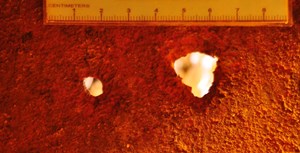US safety board seeks more regulation of chemical storage tank areas
2/10/2014 12:00:00 AM
By MARK DRAJEM
Bloomberg
The West Virginia storage facility that leaked a chemical tainting the water supply of 300,000 Charleston-area customers shouldn’t have been built upstream from a treatment plant, a federal investigator said.
At a congressional hearing into the spill at a Freedom Industries site that leaked last month, the US Chemical Safety Board said regulators should limit where such storage facilities are built or operate. Preliminary research suggested a gap in regulations for above-ground storage tanks, according to the board.
“The facility was simply a truck terminal and its position alongside the Elk River just upstream of the water intake was a historical anomaly that had tragic consequences,” Rafael Moure- Eraso, chairman of the independent safety board, said Monday at the House Transportation and Infrastructure hearing. “The facility just did not need to be where it was.”
 The leak of 4-methylcyclohexane methanol, or MCHM, caused West Virginia American Water Co. on Jan. 9 to issue a “do not use” order for the tap water it supplies to 300,000 people. The order, largest ever by the company, and the lingering signs of contamination a month later sparked calls for stronger state and federal rules, as well as complaints about the response of the government and the companies.
The leak of 4-methylcyclohexane methanol, or MCHM, caused West Virginia American Water Co. on Jan. 9 to issue a “do not use” order for the tap water it supplies to 300,000 people. The order, largest ever by the company, and the lingering signs of contamination a month later sparked calls for stronger state and federal rules, as well as complaints about the response of the government and the companies.The board today released a photo of the tank, which leaked a month ago, showing the corroded wall.
Licorice Odor
While that order was lifted after a week, residents complained Monday that they can smell the licorice odor associated with the chemical in their homes, and worry about long-term health effects from drinking or cooking with it. The utility said the water has MCHM at levels deemed safe by the US Centers for Disease Control.
“We’re dealing with this fear of the water, because it has this odor to it,” Jeff McIntyre, president of West Virginia American Water, said at the hearing in Charleston. “Just because you smell something doesn’t mean it’s not safe.”
McIntyre defended a decision by the utility not to close off its water intake and shut the water system altogether, saying it could have taken a month to restart.
The Freedom Industries complex in Charleston was subject to a patchwork of federal and state regulations that allowed hazardous materials to be stored less than 2 miles upstream from a treatment facility for drinking water. While the CDC set a standard of one part per million of the chemical as safe for use, it can still present an odor at much lower concentrations.
A representative of Freedom Industries was invited to testify today and did not appear at the hearing.






Comments